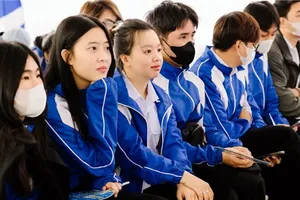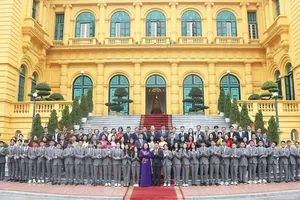
Differences in recognition
For the 2025 admissions cycle, some universities accept the VSTEP certificate (Vietnam’s six-level English proficiency framework) as a criterion, while others do not. Similarly, IELTS score requirements vary—some universities accept scores as low as 4.0 to 4.5, while others require at least 5.0.
For the admission method combining high school graduation exam results with international language certificates (English or French), Hanoi Medical University only accepts IELTS or TOEFL. HCMC University of Medicine and Pharmacy recognizes only IELTS. Meanwhile, universities such as Hanoi University of Science and Technology, HCMC Banking University, Saigon University, and HCMC University of Industry and Trade accept VSTEP and convert it into English subject scores in their admission process.
Each university applies different conversion scales for English certificates. According to recently announced 2025 admission plans, IELTS scores are converted into English subject scores ranging from 6 to 10 points. For an IELTS score of 5.0, Hanoi University of Science and Technology assigns 8.5 points, Vietnam Women's Academy 7 points, and universities such as HCMC University of Agriculture and Forestry and University of Transport and Communications 8 points.
Some universities also grant bonus points to applicants with international English certificates. For instance, Hanoi National University of Education adds 1 to 3 points for applicants with an IELTS score of 6.5 or higher when applying to English-taught programs in English Language Teaching, Mathematics, Physics, and Chemistry.
Ensuring fairness
At a recent university admissions fair at HCMC University of Technology and Education, a high school principal noted that setting English proficiency requirements in admissions is within the authority of universities. Since foreign language proficiency is also a mandatory graduation requirement, students with language certificates gain an advantage not only during admissions but also throughout their studies and at graduation.
However, students from remote and rural areas may face disadvantages when universities prioritize applicants with international language certificates. This raises concerns about fairness in admissions. Universities should carefully balance their quotas to ensure equal opportunities for all candidates.

According to the Training Board of Vietnam National University, HCMC (VNU-HCM), prioritizing applicants with international language certificates is an inevitable trend to meet training quality standards and employer demands. However, to ensure fairness, VNU-HCM member universities apply different foreign language admission criteria. Some universities require international language proficiency for admission, while others use it as a secondary criterion. Some adopt a combined approach that includes language certificates, and certain programs mandate them. However, applicants should not be overly concerned, as universities still allocate most of their admission quotas without requiring international language certificates.
M.A. Nguyen Thi Kim Phung, Deputy Director of the Center for Admissions and Corporate Relations at HCMC University of Finance and Marketing, emphasized that students applying for university admissions in 2025 should thoroughly research the admission criteria for each program. This includes understanding how language certificates are converted into scores, how priority points are awarded, and the specific regulations regarding certificate validity and score requirements to enhance their chances of getting into their desired university.
According to Assoc. Prof. Dr. Nguyen Thu Thuy, Director General of the Higher Education Department under the Ministry of Education and Training, the draft university admission regulations for 2025 allow universities to convert international language certificates into foreign language scores in admission combinations that include a language component. Consequently, candidates with valid international language certificates will not be required to take the foreign language exam in the 2025 national high school graduation exam.
























